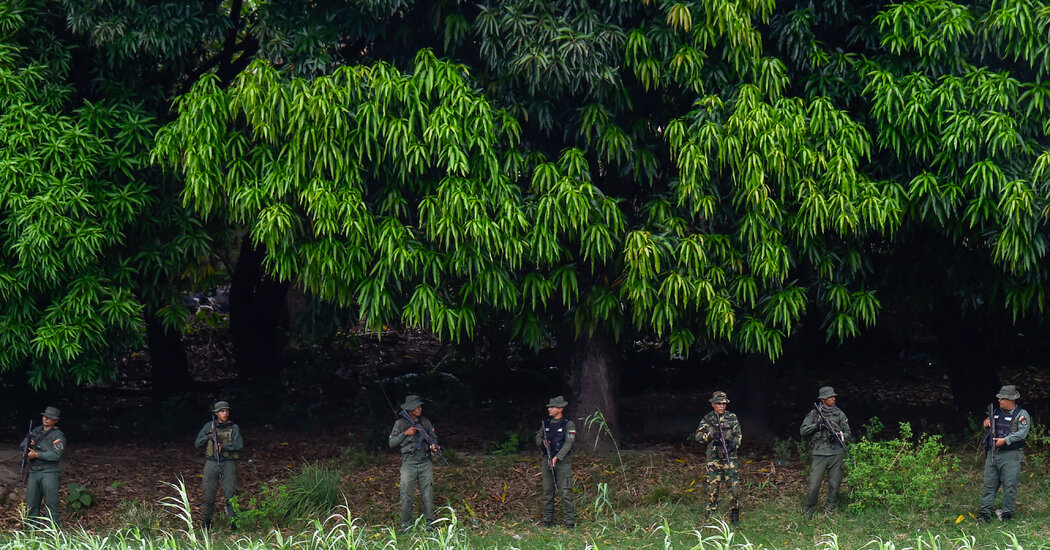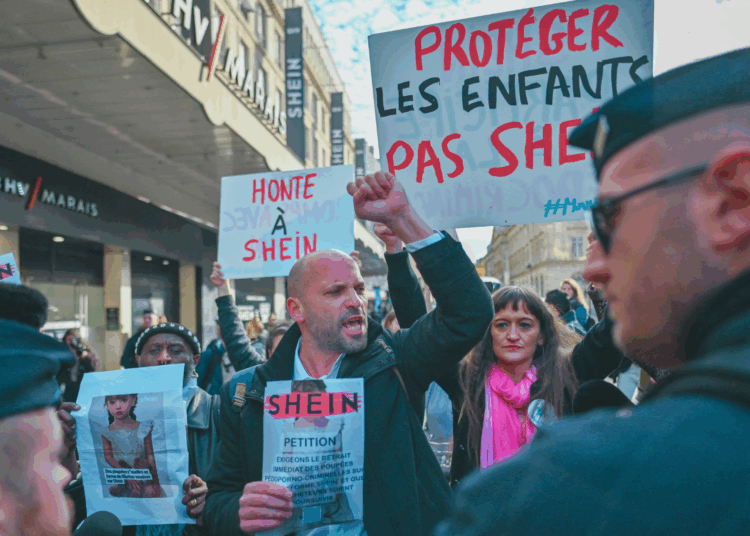Iranian cruise missiles designed to take out vessels at sea. Russian surface-to-air missiles for striking low-flying aircraft. Chinese armored vehicles for putting down protests. Even some aging American F-16 fighter jets.
On paper, Venezuela seems to have stout defenses that could challenge the military firepower of the United States.
The country’s unusual arsenal, acquired largely from U.S. adversaries and combined with years of arming civilians to bolster its defenses, highlight the challenges the United States might confront as its forces amass in the Caribbean. American officials are weighing various options for military action against Venezuela to end the authoritarian rule of President Nicolás Maduro.
But appearances can be deceiving. Unlike the military in neighboring Colombia, Venezuela’s armed forces lack the experience of actually fighting in a war.
Venezuela’s military is plagued with problems, including poorly maintained weaponry, lack of training and desertions, said James Story, the American ambassador to Venezuela from 2018 to 2023.
In a country with a long history of coup attempts, cohesion in the upper ranks of the Venezuelan military is another matter of debate: Could a challenge to Mr. Maduro come from his own generals?
Then there’s the question of how Venezuela’s military would react if Mr. Maduro falls.
Some experts warn that the country could descend into Libya-style upheaval if the armed forces fracture into rival groups. Others say both regular soldiers and armed civilians would offer little resistance if the U.S. military intervenes with overwhelming force. Here’s what to know about Venezuela’s military and Mr. Maduro’s attempts to make his regime “coup-proof.”
How big are Venezuela’s armed forces?
“Venezuela has capabilities which are unique in the region,” said Mr. Story, the former American envoy.
When Venezuela was flush with oil revenues, its leaders went on a buying spree. Barred from acquiring U.S. arms, Venezuela turned to suppliers like Iran, which provided the technology to make missile-carrying drones.
But by far Venezuela’s biggest arms supplier is Russia, which has provided everything from tanks and helicopters to Dragunov sniper rifles and Igla-S shoulder-fired missile launchers.
Russia helps maintain some of the weapons systems. Underscoring the close ties, a Russian Ilyushin Il-76 plane, capable of carrying 50 tons of military cargo, landed in Caracas in October. Mr. Maduro has asked Russia and China to help strengthen military capabilities, The Washington Post reported.
Russian-made Sukhoi fighter jets form the backbone of Venezuela’s air defenses. On paper, these planes give Venezuela one of Latin America’s most capable combat aircraft fleets, equipped with long-range air-to-air missiles.
But doubts persist about how many of Venezuela’s Sukhois are operational. Venezuela flew two of its aging U.S.-made F-16’s in a show of force in September over a U.S. Navy guided-missile destroyer.
Estimates vary widely, but Venezuela, in all, is thought to have more than 30 working combat aircraft, more than 40 navy vessels and as many as 200 tanks.
Venezuela also maintains one of Latin America’s largest standing armies. Across all branches, Venezuela has about 150,000 members in its armed forces, said John Polga-Hecimovich, a Venezuela scholar at the U.S. Naval Academy.
Venezuela complements these forces with armed pro-Maduro cells called colectivos that function as paramilitary enforcers for the government and, while they have never been tested in battle, could help repel an invasion.
The Bolivarian Militia, which organizes civilians into armed reserve units, might provide another layer of defense.
Mr. Maduro claims the militia could mobilize 8 million reservists, but military analysts say that is a wild exaggeration. Mr. Polga-Hecimovich said a more plausible estimate for the militia’s size is about 1 million, but even so it is unclear if civilians could offer much resistance to a heavily armed U.S. intervention.
How could those forces respond to U.S. military action?
The U.S. military buildup is shaping up to become the biggest test in recent memory for Venezuela’s armed forces. The United States has deployed about 10,000 troops to the region; thousands more will arrive soon aboard the Gerald R. Ford aircraft carrier.
The Trump administration says its campaign is aimed at drug smugglers mostly coming from Venezuela, though Venezuela does not play a major role in the global drug trade. U.S. strikes have killed some 65 people on boats in the Caribbean and the eastern Pacific.
A broad range of legal specialists say the strikes violate international law because those killed did not present an immediate military threat. The leaders of Venezuela and Colombia claim the attacks amount to murder.
Beyond the stated focus on drugs, Trump administration officials, in private, say the goal is to oust Venezuela’s leader, President Nicolás Maduro. The C.I.A. has been given authorization to conduct covert actions inside Venezuela, and President Trump has said land strikes were coming.
The U.S. deployment, featuring B-52 bombers, Reaper drones and the elite Army Special Operations aviation unit called the “The Night Stalkers,” dwarfs Venezuela’s conventional capabilities.
But for years Venezuela’s leaders have prepared for what they call asymmetric warfare, drawing up insurgency plans against a much larger rival and arming civilians to resist a U.S. invasion.
The street-level paramilitary cells called colectivos could, for example, turn Caracas into a deadly theater for urban guerrilla warfare in which combatants find refuge in the city’s hilly topography and abandoned high-rises, security experts said.
Will Venezuela’s armed forces remain loyal to Maduro?
Venezuela is no stranger to coup attempts. Hugo Chávez, who preceded Mr. Maduro in power, rose to prominence after organizing a failed coup in 1992. Rumors swirl constantly in Venezuela and among exiles about supposed conspiracies.
But Mr. Maduro has proved adept at fending off serious challenges to his rule. When Venezuela was engulfed in unrest from 2017 to 2020, fueled in part by an economic crash and food scarcity, his government thwarted at least nine military mutinies, largely from midlevel officers, Mr. Polga-Hecimovich said.
One sign of stability is the long tenure of Mr. Maduro’s defense minister, Vladimir Padrino López, who has held the role for 11 years.
Former military figures in Venezuela attribute Mr. Maduro’s grip on the armed forces to a variety of factors.
One is a climate of fear and paranoia. For years, government officials have seeded agents in the military from Cuba and from Venezuela’s General Directorate of Military Counterintelligence in advisory roles, where they monitor any signs of dissent.
Officers branded as disloyal face severe consequences. Claims of torture have emerged from holding cells, documented by lawyers, human rights activists and United Nations officials. Some senior military figures who clashed with Venezuela’s leaders have died in prison.
Chilean authorities said this year that Mr. Maduro’s government ordered the assassination of Ronald Ojeda, an exiled 32-year-old former Venezuelan Army officer whose body was found buried under nearly five feet of concrete.
The Maduro government has vehemently denied responsibility.
Of the 875 political prisoners held by the Venezuelan government, 173 are members of the military, according to a watchdog group, Foro Penal.
Economic self-interest may also help hold back a rebellion.
Mr. Maduro has allowed senior military figures to profit from drug trafficking or unauthorized mining ventures, linking their fortunes to his own, according to former military officers. Any rupture in that model could deprive generals and admirals of coveted income in a country facing widespread poverty and unemployment.
“Their primary aim is to preserve their illicit financial activities,” said José Gustavo Arocha, a former lieutenant colonel in the Venezuelan Army.
What happens if Maduro falls?
The possibility that Venezuela’s president could be forced from power raises numerous questions: Will the armed forces support a new interim leader? Who will guard critical infrastructure like airports, oil fields and power plants? Could the military splinter into different factions, vying for control of lucrative smuggling routes and illegal mining operations?
Zair Mundaray, a former top Venezuelan prosecutor, said the country was different from nations like Libya or Syria, which fell into civil war or sectarian conflict when their authoritarian leaders were challenged. Those countries, he argued, had long been marked by major sectarian or ethnic divisions.
“I view a fratricidal war as improbable,” he said.
Others are not so sure, citing deep ideological divisions in Venezuelan society. They say the country should learn a lesson from Iraq, after the United States invaded and toppled the dictator, Saddam Hussein. Believing that those previously aligned with Hussein’s Baath Party could not be trusted, the country pursued the de-Baathification of senior ranks of the Iraqi military and government.
That strategy disqualified thousands from government posts, transforming some well-trained officers into leaders of an insurgency.
The possibility that Venezuela could see a revival of guerrilla warfare is not entirely far-fetched. Rebel groups from neighboring Colombia already operate in parts of Venezuela, and Venezuelan civilians said to have been trained by these groups have already sided with Mr. Maduro in past times of crisis.
Julie Turkewitz contributed reporting from Bogotá, Colombia.
Simon Romero is a Times correspondent covering Mexico, Central America and the Caribbean. He is based in Mexico City.
The post How Would Maduro’s Military Respond to U.S. Pressure? appeared first on New York Times.




